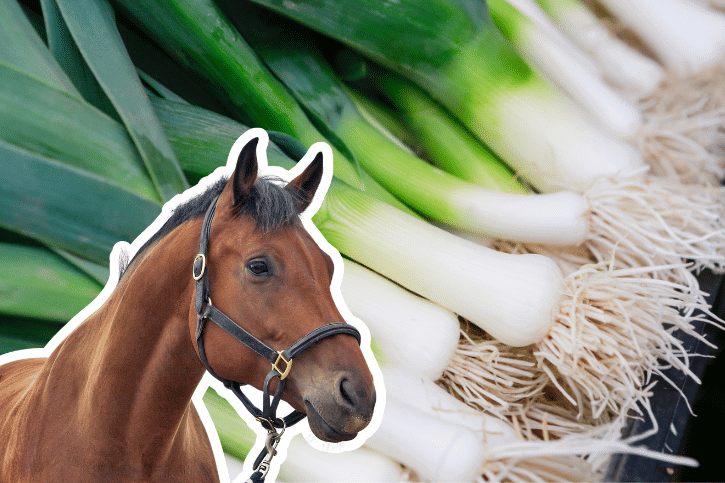Can Horses Eat Leeks?
I cooked up a lovely stew for dinner the other night, and it went down a treat with the whole family.
It was a leek and potato stew, which happens to be my speciality.
However, on this occasion, I wasn’t doing the shopping, and a minor breakdown in communication meant that I ended up with twice as much leek as I needed.
We were all a bit sick of leek by the time the stew was all gone, so I had to come up with something else to do with it.
I always like to check if I can share stuff with my horses, so I decided to look into that.
So, can horses eat leeks?
No, horses should never eat leeks. Leeks are toxic to horses and can kill them even in relatively small quantities. Leeks are part of the Allium family, all of which contain a chemical compound which damages blood cells and can even be fatal. Never feed your horse leeks.
So, alas, I had to find something else to do with my leeks.
Nonetheless, I learned a valuable lesson about what not to include in my horse’s diet, as I’d never realised just how dangerous leeks were.
So, let’s look at why in a bit more detail.
Why is leek dangerous for horses?
As I mentioned, leeks are part of the Allium family of vegetables, all of which contain a compound call N-propyl.
The propyl group is a group of compounds found in a variety of organic matter.
N-propyl is dangerous in a number of ways, but for horses, it destroys red blood cells.
Red blood cells are essential for circulatory health, and when they are destroyed your horse can become anemic.
Anemia has many varieties and causes, but the root of the condition means that your horse will essentially lack the proper amount of healthy red blood cells needed to carry oxygen to all parts of the body.
Without essential oxygen, your horse will become weak and exhausted, and will cause all sorts of deficiencies.
In large enough quantities, then, the N-propyl in leeks could cause your horse to lose all oxygen to its extremities and vital organs.
This could cause death by any number of means, whether through starving the brain of oxygen, kidney or liver failure.
Leeks may not seem like it, but they are very, very dangerous for horses.
As I said, leeks are part of a larger family of vegetables that cause the same problem, so let’s just establish what that family is as well.
What is the Allium family?
The word Allium itself denotes a whole genus of flowering plants including hundreds of species. Many of these species we don’t eat, and many are indeed simply flowering plants or stems.
The word Allium is actually Latin for garlic, which tells you that horses should not eat garlic, either.
In general, Allium plants are characterised by long, fibrous stalks made up of many smaller pieces of matter.
They grow upright from the ground, and the bulbs vary a lot. Some have thickened leaf-bases rather than bulbs, but the thing for you to know as a horse owner is that they all contain N-propyl.
If you imagine a leek, it gives you a good idea of what else is included that’s similar: garlic, spring onions, and many naturally occurring flowering plants.
There are several varieties of leek, though, and since they’re so popular and healthy for humans, it’s difficult to imagine that not one of them is safe for our horse friends.
Can horses eat Almera leek?
Almera leeks are one of the most popular and widely cultivated, a fall variety that crops from mid-July to September.
They have long, slender stems or sometimes mid green semi-upright leaves.
Almera leeks contain concentrations of N-propyl high enough to do serious harm to your horse and at worst to cause fatal injury, so do not feed Almera leeks to your horse.
Can horses eat Atlantic leek?
The Atlantic leek has also been immensely popular for its ability to withstand winter weather, with an excellent frost tolerance for winter cropping even into the new year.
Crops like this can often be a great boon in places where it’s hard to grow fresh vegetables to feed to your horse through the winter.
As you have probably guessed, though, the concentration of N-propyl remains dangerously high, and you should not let your horse eat Atlantic leek.
Can horses eat pot leek?
Pot leek, finally, is another popular variety, a favorite to grow for exhibitions.
They are no better than any other variety, and will harm your horse if it eats them.
No matter the variety, then, leeks are no good for horses.
They are very dangerous and can easily kill your horse if fed in even relatively small quantities.
There are plenty of great treat alternatives that you can feed them that will keep them happy that poses no danger.
Stay away from not just leeks, but the entire Allium family—none of it is safe for your horse.
